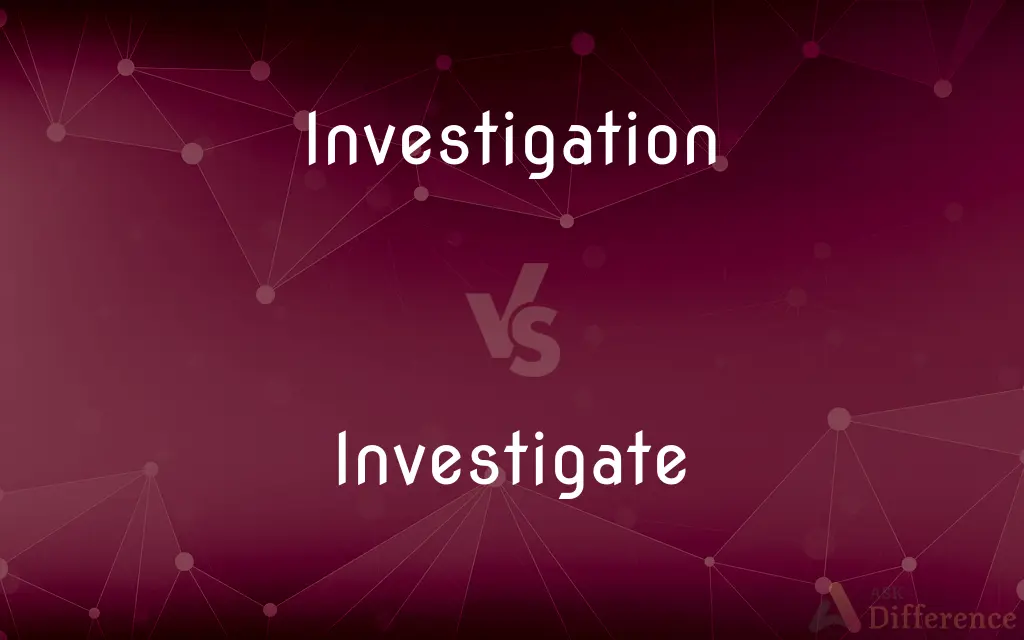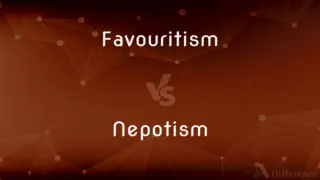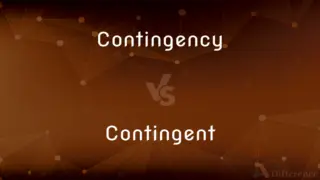Investigation vs. Investigate — What's the Difference?
Edited by Tayyaba Rehman — By Maham Liaqat — Updated on April 5, 2024
Investigation is the process of examining a matter, while investigate is the action of conducting an examination.

Difference Between Investigation and Investigate
Table of Contents
ADVERTISEMENT
Key Differences
Investigation refers to the systematic process or procedure undertaken to uncover facts or information about a specific subject, event, or allegation. It involves various methods, such as collecting evidence, interviewing witnesses, and analyzing data. Investigate, on the other hand, is the verb form that describes the act of carrying out an investigation. It denotes the action of looking into a matter closely and carefully to discover the truth.
The noun 'investigation' encapsulates the entire scope of the inquiry, including all activities and efforts made from start to finish. It is the comprehensive term that refers to the entire operation. Whereas 'investigate' focuses on the active process and steps taken by individuals or teams to delve into the matter at hand, highlighting the dynamic aspect of seeking information.
An investigation is often initiated after preliminary findings or suspicions warrant a deeper look into the matter. It can be formal or informal, conducted by law enforcement agencies, organizations, or individuals. Investigate implies the start of this process, where one actively engages in examining the details and evidence of the case or topic.
The outcomes of an investigation are typically comprehensive, aiming to resolve questions, confirm or dispel suspicions, and possibly lead to further actions based on its findings. The verb investigate is used to describe the ongoing activity that may lead to these outcomes, emphasizing the procedural nature of uncovering facts.
While 'investigation' can refer to both the process and the entity conducting the inquiry (e.g., "The investigation by the police concluded..."), 'investigate' specifically refers to the actions taken by the entity ("The police investigate the crime"). This distinction highlights how one term focuses on the entity and process, while the other emphasizes the action.
ADVERTISEMENT
Comparison Chart
Part of Speech
Noun
Verb
Definition
The process of examining a matter systematically.
The act of conducting an examination.
Focus
Encompasses the whole process and its outcome.
Focuses on the action of examining.
Usage
Refers to the entire operation or inquiry.
Describes the act of engaging in the operation.
Outcome
Aims to resolve questions or confirm details.
The ongoing activity leading to outcomes.
Compare with Definitions
Investigation
Can be broad, covering various activities to uncover facts.
The investigation lasted several months, involving numerous interviews.
Investigate
Can involve various techniques, from observation to complex analysis.
Scientists investigate climate change using satellite data and climate models.
Investigation
Results in a conclusion based on gathered evidence and analysis.
The investigation concluded with recommendations for improving safety protocols.
Investigate
Involves actively seeking information or evidence.
The detective will investigate the suspect's alibi tonight.
Investigation
Conducted by individuals, organizations, or authorities.
The federal agency took over the investigation due to its complexity.
Investigate
Indicates the beginning or ongoing nature of an inquiry.
To better understand the phenomenon, we must investigate the underlying causes.
Investigation
Aims to uncover the truth, resolve issues, or gather evidence.
The primary goal of the investigation was to determine the cause of the accident.
Investigate
On the procedural aspect of seeking information.
The journalist set out to investigate the story behind the public figure's sudden resignation.
Investigation
The systematic examination of a matter.
The investigation into the company's finances revealed discrepancies.
Investigate
To carry out an inquiry or examination.
They decided to investigate the anomalies in the data further.
Investigation
The action of investigating something or someone; formal or systematic examination or research
He is under investigation for receiving illicit funds
Investigate
Carry out a systematic or formal inquiry to discover and examine the facts of (an incident, allegation, etc.) so as to establish the truth
Police are investigating a claim that the man was beaten unconscious by a gang
Investigation
The act or process of investigating
A politician under investigation.
Investigate
To observe or inquire into in detail; examine systematically
Investigate a crime.
Investigate ways to use less energy.
Investigate whether the virus is contagious.
Investigation
A careful examination or search in order to discover facts or gain information.
Investigate
To make a detailed inquiry or systematic examination.
Investigation
The act of investigating; the process of inquiring into or following up; research; study; inquiry, esp. patient or thorough inquiry or examination; as, the investigations of the philosopher and the mathematician; the investigations of the judge, the moralist.
Investigate
(transitive) To inquire into or study in order to ascertain facts or information.
To investigate the causes of natural phenomena
Investigation
An inquiry into unfamiliar or questionable activities;
There was a congressional probe into the scandal
Investigate
(transitive) To examine, look into, or scrutinize in order to discover something hidden or secret.
To investigate an unsolved murder
Investigation
The work of inquiring into something thoroughly and systematically
Investigate
(intransitive) To conduct an inquiry or examination.
Investigate
To follow up step by step by patient inquiry or observation; to trace or track mentally; to search into; to inquire and examine into with care and accuracy; to find out by careful inquisition; as, to investigate the causes of natural phenomena.
Investigate
To pursue a course of investigation and study; to make investigation.
Investigate
Investigate scientifically;
Let's investigate the syntax of Chinese
Investigate
Conduct an inquiry or investigation of;
The district attorney's office investigated reports of possible irregularities
Inquire into the disappearance of the rich old lady
Common Curiosities
What triggers an investigation?
Investigations are typically triggered by suspicions, allegations, anomalies, or the need for detailed information about a specific matter.
What methods are used to investigate?
Methods include collecting and analyzing evidence, interviewing witnesses, conducting experiments, or using specialized investigative techniques.
Is an investigation always formal?
Not always; investigations can be formal or informal, ranging from structured legal inquiries to casual personal efforts to uncover information.
What is the goal of an investigation?
The goal is to uncover facts, resolve questions, confirm or dispel suspicions, and sometimes gather evidence for legal proceedings.
How do investigations conclude?
Investigations conclude with a report or summary of findings, which may lead to actions such as legal proceedings, policy changes, or simply the resolution of a question.
How does an investigation start?
An investigation starts with a decision to investigate, often following preliminary findings that suggest a deeper examination is warranted.
Can anyone investigate a matter?
Yes, investigations can be conducted by law enforcement, organizations, or individuals, depending on the context and the nature of the investigation.
Can an investigation be reopened?
Yes, investigations can be reopened if new evidence emerges or if initial inquiries were deemed insufficient.
Can investigate be used as a noun?
No, 'investigate' is a verb. The noun form related to this action is 'investigation'.
What is the difference between investigating and researching?
Investigating often implies a focus on uncovering specific facts or resolving a particular issue, while researching is broader, involving the study of materials and sources to establish facts and reach new conclusions.
Share Your Discovery

Previous Comparison
Favouritism vs. Nepotism
Next Comparison
Contingency vs. ContingentAuthor Spotlight
Written by
Maham LiaqatEdited by
Tayyaba RehmanTayyaba Rehman is a distinguished writer, currently serving as a primary contributor to askdifference.com. As a researcher in semantics and etymology, Tayyaba's passion for the complexity of languages and their distinctions has found a perfect home on the platform. Tayyaba delves into the intricacies of language, distinguishing between commonly confused words and phrases, thereby providing clarity for readers worldwide.















































